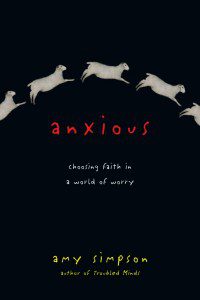Author, Anxious: Choosing Faith in a World of Worry
I can relate to sixteenth-century French writer Michel de Montaigne, who wrote, “My life has been full of terrible misfortunes, most of which never happened.”
I’ll bet you can relate too. We all worry about the future. And most of us are willing to admit that we sometimes lie awake at night, suffering through possibilities that never become reality. We also suffer from realities that for all our worry, we never saw coming and never could have avoided.
One of the most common causes of worry is the unknown future. In fact, a quick Google search will tell you that most of Americans’ top worries are rooted, in some way, in the time yet to come.
Sometimes our worry takes the form of actually trying to discern what will happen in the future: “If only I knew what would happen, I could make a decision.” I wish I had back all the energy I’ve wasted on trying to determine future outcomes I couldn’t access. The harsh reality is, we simply don’t get to see, know, hold, touch, or even count on the future. Worrying over it is like sending our best mental and emotional energy into a black hole.
The Problem with Worry
When people try to address the problem of worry in their lives, they sometimes unwisely try to rid themselves of all fear and anxiety—which is like addressing a cold by treating a fever and drinking caffeine. As long as they don’t get too high, fevers are good, natural tools our bodies use to fight infection. Exhaustion is our bodies’ way of telling us we need to rest. Ignoring and artificially conquering these symptoms won’t make us better; it might even make us sicker. Similarly, fear and anxiety are healthy tools we need access to.
Fear is an appropriate response in the face of immediate danger. It produces a physical response, often called “fight or flight,” that helps us handle or escape the situation. Anxiety produces a similar response, but in anticipation of a possible threat. It can be very handy in helping us avoid trouble. Sometimes this healthy anxious response turns against us and works overtime, with our brains and bodies believing we are threatened when we are not. Such an anxiety disorder is merely a physiological process working too well—and requires treatment with counseling, medication, or both.
Worry, on the other hand, is a choice. It’s an action that keeps us in a state of fear or anxiety when that response isn’t necessary or helpful. It activates the “fight or flight” response our bodies were created to employ in times of emergency and applies them to non-emergency situations. It’s a waste of good resources and a source of harm to our bodies, minds, spirits, and relationships. Worry never helps us and always hurts.
In a 2010 survey of the American Psychological Association, 40 percent of people said that in the past month, stress had caused them to overeat or eat unhealthy foods. Nearly one-third said they had skipped a meal because of stress, and more than 25 percent said they had been unable to sleep. One survey found that more than 60 percent of American workers worry they will lose their jobs, with 32 percent saying they worry about this “a lot.” Parents commonly worry about their kids, and big worries start when children are small. In a Baby Center survey, parents of very young children indicated their top cause for worry was “I’m afraid my child won’t get the education and opportunities she needs to reach her potential.”In infancy! Such worries distract all of us from enjoying and intentionally building on the time we have right in front of our noses.
Fear can protect us in times of danger. A healthy level of anxiety, along with wisdom and good planning, can help us make good decisions and avoid bad ones. Worry, on the other hand, never helps.
Three Questions
Worry over anything is essentially a pointless activity. But when we stop to think about it, worry over the future may be the most nonsensical waste of all. It just doesn’t make sense for us to worry over and try to live in a dimension which, by its very definition, never arrives. The future belongs only to God.
If the future isn’t ours and might never be—why try to live there? We try to upset the very fabric of the universe when we live in “what if?”
By contrast, God has given us the present. When we ignore the present because we’re trying to discern the future, we reject what he has given us in favor of what we can’t have. When we worry over the future, we’re almost always imagining a scenario without God’s intervention and goodness, without his provision, without the unforeseen good that is always possible. And the chances of something good happening in the future are at least as good as the chances of bad.
When faced with the cold, creeping fingers of worry about the future, consider these three questions:
1. Is it fear, anxiety, or worry?
Respond appropriately. If it’s fear, fight or flee. If it’s anxiety, avoid the situation. If it’s worry, read my book Anxious: Choosing Faith in a World of Worry and consider the faulty belief that is fueling your worry. If it’s an anxiety disorder that is interrupting your ability to function normally, seek help from a medical or mental health professional.
2. Can I do anything about it?
If you’re worrying instead of taking action to ensure a positive outcome, take action! Protect your loved ones, save money, have the difficult conversation, break off a relationship, quit your job, look for a new job, or do whatever you’re needing to do and avoiding. If you don’t have any control over the situation, pray, acknowledge God’s power, and accept his peace. Admit that worrying won’t help.
3. What do I already know?
Rather than focus on what you don’t know and can’t see, focus on what you do know is true. God is in control, God lives in the future, and everything that worries you belongs to him. Reflect on how he has cared for you in the past. Consider the character and capabilities of people who have the ability to come through again. Remember that as a follower of Christ, your ultimate outcome is certain.
Scripture makes very clear that we are expected to live by faith in God’s will for us and this world (James 4:13-16), and that humans are like grass—here today and gone tomorrow (Psalm 103:13-16). Worrying about the future tends to empty the present of its joy and dampen our positive engagement with others. In other words, it paralyzes our mission as God’s people on this planet. People who fully engage in the present, without worry over the future, are able to make more of the time God gives us and to live in harmony with our calling. May we be people who live by faith and purpose, standing firm in a world bent by worry.
For more conversation on Anxious: Choosing Faith in a World of Worry, visit the Patheos Book Club here.
 Amy Simpson is author of Anxious: Choosing Faith in a World of Worry. She also serves as editor of Gifted for Leadership, Senior Editor of Leadership Journal, a speaker, and a Co-Active personal and professional coach. You can find her at AmySimpsonOnline.com and on Twitter @aresimpson.
Amy Simpson is author of Anxious: Choosing Faith in a World of Worry. She also serves as editor of Gifted for Leadership, Senior Editor of Leadership Journal, a speaker, and a Co-Active personal and professional coach. You can find her at AmySimpsonOnline.com and on Twitter @aresimpson.













